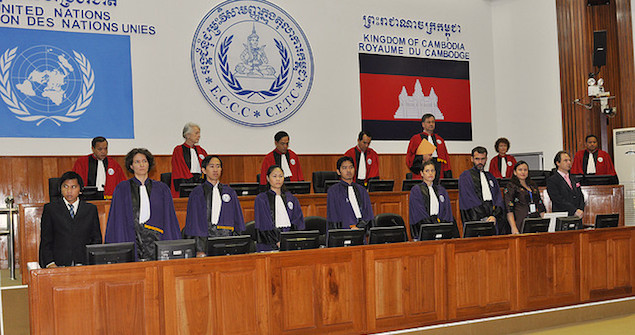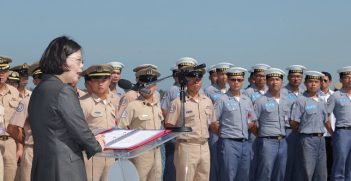Post Conflict Justice: The Extraordinary Chambers in the Courts of Cambodia

The presence and perseverance of the Extraordinary Chambers in the Courts of Cambodia demonstrate Cambodia’s resilience and desire for post-conflict justice.
The brutal Khmer Rouge regime caused the deaths of approximately 1.7 million Cambodians from 1975 to 1979 by slaughtering the country’s elite and emptying cities in a radical attempt to create an agrarian communist utopia. Although this genocide occurred close to 40 years ago, senior leaders of the Khmer Rouge are presently being brought to trial by the UN-backed Extraordinary Chambers in the Courts of Cambodia (ECCC). Applying national and international law principles, the ECCC’s hybrid structure renders this international tribunal the first of its kind.
The ECCC
To date, only one case has been finalised. In 2011, the Supreme Court Chamber dismissed the conviction and sentence appeal from Kaing Guek Eav (commonly referred to by his alias, Duch). Duch was the chairman of the notorious S-21 prison, in which close to 12,000 people were detained, tortured and subsequently murdered. He is currently serving a sentence of life imprisonment.
The Trial Chamber of the ECCC is presently hearing Case 002, concerning Nuon Chea and Khieu Samphan who each served in high-level positions within the Khmer Rouge. Case 002 has been split into two sections with a trial judgment issued in Case 002/01 in August 2014 (now subject to appeal). Case 002/02 is part heard, and resumed earlier this month.
Criticisms of the ECCC
It is no secret that the ECCC has been subject to criticism. The advanced age of those being tried places significant time pressures on the timely dispensation of cases. This in itself exacerbates other criticisms such as delay and overspending. Moreover, allegations of political interference with the trial have recently surfaced in Nuon Chea’s appeal against the judgment in Case 002/001. Such allegations are perhaps intensified by the fact that Cambodia’s current prime minister, Hun Sen, is a former Khmer Rouge soldier. Ultimately however, the Supreme Court Chamber will be the forum in which these allegations will be argued and ruled upon.
The Big Picture: Post Conflict Justice
Many courts around the world, including international tribunals, experience hardship such as financial constraints, backlogs, and in some jurisdictions, political pressure. In the case of the ECCC, emphasis should not be placed on its perceived shortcomings. Rather, attention must be directed to the broader, paramount issue: post-conflict justice.
Post-conflict justice evokes a number of concepts such as accountability, reconciliation, reform and the rule of law. These are incredibly important ingredients in facilitating the repair of a society that has been devastated by crimes against humanity. It seems that the ECCC brings about two important benefits to Cambodia: reconciliation and the protection of the rule of law,
Reconciliation
A unique feature of the ECCC is the provision for victims to apply to become civil parties. Such parties are permitted to furnish statements about their suffering and, moreover, may seek moral reparations from the accused. The importance and key role bestowed upon victims further strengthens the reconciliatory value of the ECCC.
The ECCC also operates as a forum for the communication of apology. During the course of Case 001, the accused, Duch, issued a number of statements of apology. Although the sincerity of such statements has been questioned, a passage from the Case 001 Appeal Judgment sheds some light on their value:
“Notwithstanding the fact that not all victims accept the sincerity of the apology, its value is still retained by virtue of publication and memorialisation of the harm and the apology. Apology transcends the time and the scene of the courtroom and in this sense contributes to just satisfaction in the long term and beyond the immediate audience”.
Protection of the Rule of Law
If a government can commission the detention, degradation and murder of its own people, such a government is likely to have assumed that it would never be held accountable for any wrongs committed. The evidence put before the ECCC during the course of the trials is illustrative of this mentality. The Khmer Rouge leaders were meticulous record keepers, and a number of lists of the people who were detained and killed in prisons have been admitted into evidence.
This type of evidence is indicative of a period in Cambodia during which the rule of law had no place. It goes without saying how manifestly important it is that the rule of law operates stringently and without discrimination. Trying former government leaders is a commendably high standard for the application of the rule of law in any state and sets a remarkable standard for Cambodia’s domestic justice system.
In circumstances where 65 per cent of Cambodia’s population is under 30 years of age, many of those aggrieved have not lived to see justice be achieved at the trials. However, the ECCC’s presence and perseverance demonstrates Cambodia’s resilience and unwavering pursuit for post-conflict justice.
Samantha is a Legal Intern at the Extraordinary Chambers in the Courts of Cambodia and a recipient of the AIIA’s Euan Crone Scholarship. The views expressed in this article are solely of the author and not that of the Extraordinary Chambers in the Courts of Cambodia. This article can be republished with attribution under a Creative Commons Licence.





